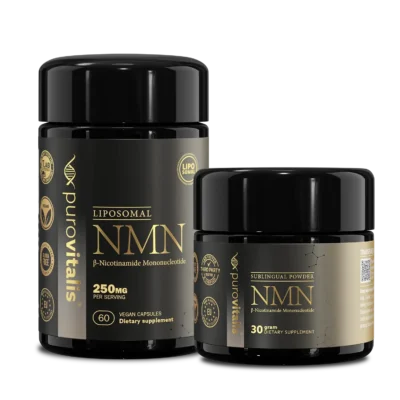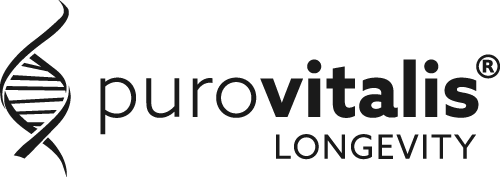
table of contents
For over a decade, NMN has been a focus of scientific interest due to its role in supporting cellular energy production and maintaining NAD⁺ levels — a key factor in metabolic health and aging.
Animal studies have consistently shown promising effects: improved endurance, enhanced mitochondrial function, and signs of slowed biological aging.
However, many of the claims about NMN’s effects in humans have so far relied on preclinical data. This has led to criticism, especially due to the lack of clinical evidence on its effectiveness and — just as importantly — its safety in healthy individuals.
That uncertainty now appears to be addressed. A new randomized, placebo-controlled clinical trial has examined both the efficacy and safety of NMN supplementation in healthy middle-aged adults — and the results offer fresh insight into its potential role in human health, energy, and longevity.
Purpose of the study
Researchers from the US, China, Netherlands, and India have joined forces to conduct a human clinical trial on the efficacy of NMN, the results of which have been published in the GeroScience Journal in December 2022.
The study was titled: The efficacy and safety of β-nicotinamide mononucleotide (NMN) supplementation in healthy middle-aged adults: a randomized, multicenter, double-blind, placebo-controlled, parallel-group, dose-dependent clinical trial.
This clinical trial was designed to evaluate how NMN supplementation affects healthy adults in midlife. A total of 80 participants between the ages of 40 and 65 took part in the study. They were randomly assigned to receive either a placebo or a daily oral dose of NMN — 300 mg, 600 mg, or 900 mg — for 60 days.
The study followed a rigorous design: it was randomized, double-blind, and placebo-controlled, meaning neither participants nor researchers knew who received NMN and who received the placebo during the trial period.
The primary aim of the study was to measure changes in blood NAD⁺ levels.
In addition, the researchers assessed several secondary outcomes:
- Overall safety and tolerability, based on lab tests and reported side effects
- Physical endurance, measured using a 6-minute walking test
- Biological age, estimated through blood-based biomarkers
- Quality of life, evaluated via a questionnaire
How the study was conducted
This was a randomized, double-blind, placebo-controlled, parallel-group, dose-dependent, multicenter clinical trial — a methodologically solid design commonly used in clinical research to ensure reliable and unbiased results.
The study included 80 healthy adults between 40 and 65 years old. Participants were randomly assigned to one of four groups: three NMN groups (300 mg, 600 mg, and 900 mg) and one placebo group. Each participant took their assigned capsules once daily for 60 days before breakfast.
The NMN capsules contained 150 mg of pure β-nicotinamide mononucleotide. The placebo capsules were identical in appearance and filled with 150 mg of rice flour.
Group overview
| Group | Daily intake |
|---|---|
| Placebo Group | 2–6 placebo capsules (150 mg rice flour each) |
| 300 mg NMN Group | 2 × 150 mg NMN |
| 600 mg NMN Group | 4 × 150 mg NMN |
| 900 mg NMN Group | 6 × 150 mg NMN |
Inclusion and exclusion criteria
Eligible participants were healthy adults within the specified age range. Exclusion criteria included the use of NAD-related supplements before the trial, current use of statins, smoking, recent drug or alcohol misuse, or participation in other clinical studies.
Pregnant or breastfeeding women were excluded, and all female participants underwent a urine pregnancy test before enrolment.
Assessments and tests conducted
Participants were randomly assigned to one of four groups on day 0. Baseline measurements were taken prior to any supplementation. Follow-up assessments were performed on day 30 and day 60 to evaluate both efficacy and safety.
Here is an overview of the assessments conducted:
NAD⁺ concentration in the blood
The primary endpoint was the change in blood NAD⁺ levels.
A validated colorimetric assay was used to quantify total NAD⁺ and NADH in serum.
Significant, dose-dependent increases in NAD levels were observed in all NMN groups compared to both baseline and placebo. Blood was collected on day 0, day 30, and day 60.
Colorimetric test
A colorimetric test is a lab method that measures the concentration of a substance based on a color change. In this study, the test was used to detect total levels of NAD⁺ and NADH in the blood serum. The stronger the color signal, the higher the concentration.
Safety and tolerability of NMN supplementation
One of the secondary objectives was to evaluate the safety and tolerability of NMN supplementation.
To do this, researchers conducted blood and urine tests, as well as physical examinations throughout the study period. Any adverse events were recorded and monitored. Tolerability was also assessed by tracking whether participants completed the trial — and notably, no one in any group dropped out.
6-minute walking test
The 6-minute walking test was conducted on day 0, 30, and 60 to assess endurance.
Participants were instructed to walk as far as possible within 6 minutes, and the total walking distance was recorded. This served as one of the secondary outcome measures in evaluating the effect of NMN on physical performance.
Related: Study: Can NMN help you get more out of your training?
The Biological age test
The participants’ biological age was estimated using Aging.Ai 3.0 – a digital tool that calculates how old the body appears based on blood test results.
It uses 19 common blood markers, including cholesterol, blood sugar, proteins, blood count, electrolytes, and red and white blood cells. Measurements were taken at the beginning (day 0) and end of the study (day 60) to see if NMN had any impact on signs of aging in the body.
HOMA Index
This is the value that is particularly meaningful in terms of insulin resistance. It represents the extent to which insulin can still work in your body. Values between 0.8 and 1.4 are desirable. Diabetes begins at a value of about 2.5.
SF-36 Questionnaire
This questionnaire was designed to assess a participant’s quality of life and general health status.
Summary of clinical findings
Based on the assessments outlined above, the clinical trial was able to determine how various NMN supplementation dosages:
- Affects NAD⁺ concentrations in the blood
- Is tolerated by the human body
- Influences physical endurance
- Impacts biological age
- Alters insulin resistance
- Affects perceived quality of life and general health

NAD⁺ levels increased significantly in all NMN groups
- All three NMN doses (300, 600, and 900 mg/day) led to statistically significant increases in blood NAD⁺ levels compared to baseline and placebo.
- The increase was dose-dependent, but the difference between 600 mg and 900 mg was minimal.
NMN supplementation appears safe and well tolerated
- No clinically relevant abnormalities were found in any blood or urine test parameters.
- A total of 9 adverse events (AEs) were reported: 6 in the placebo group,1 in the 300 mg NMN group and 2 in the 600 mg group.
- None of the AEs were considered serious.
- No adverse event was attributed to NMN.
- No participants dropped out of the study.
Walking distance improved in NMN groups
- No significant change in walking distance was observed in the placebo group.
- All NMN groups showed significant improvements in the 6-minute walking test by day 60 compared to placebo.
- The 600 mg group outperformed the 300 mg group, while no meaningful difference was observed between the 600 mg and 900 mg groups.
You might also want to read: Study: NMN may improve muscle function.
Biological age decreased in NMN groups
- On day 60, the biological age was significantly reduced in all NMN groups compared to baseline.
- In contrast, the placebo group showed a significant increase in biological age.
Quality of life scores improved
- All NMN groups showed statistically significant improvements in SF-36 health survey scores by day 60.
- No significant differences were found between the NMN groups.
- The placebo group showed no significant improvement.
Understanding the effects of NMN
This clinical trial provides strong evidence that NMN supplementation is both safe and effective for healthy middle-aged adults. With significant improvements in NAD⁺ levels, endurance, biological age, and quality of life, NMN shows real potential as part of a healthy aging strategy.
If you’re curious about integrating NMN into your daily routine, take a look at our NMN supplements here — and feel the difference it can make in your everyday energy.
References
- Yi L, Maier AB, Tao R, Lin Z, Vaidya A, Pendse S, Thasma S, Andhalkar N, Avhad G, Kumbhar V. The efficacy and safety of β-nicotinamide mononucleotide (NMN) supplementation in healthy middle-aged adults: a randomized, multicenter, double-blind, placebo-controlled, parallel-group, dose-dependent clinical trial. GeroScience. 2022 Dec 8;45(1):29–43. doi:10.1007/s11357-022-00705-1. PMID: 36482258; PMCID: PMC9735188.

NMN supplements Europe based Liposomal delivery
Our NMN supplements are here for you to help you shine and feel your best! Try it out!








